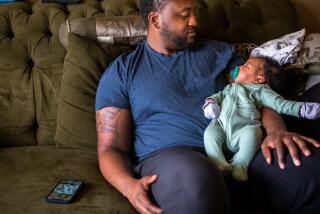Sleep Problems of Elderly Treatable, Report Says
- Share via
BETHESDA, Md. — Although more than half of Americans over age 65 suffer from sleeping disorders, they should not accept the problem as a normal consequence of growing older, a panel of medical experts said Wednesday.
The 14-member panel, convened this week by the National Institutes of Health, said that many of the elderly’s sleeping problems are treatable, even though doctors often incorrectly write them off as inevitable.
Senior citizens, on average, do sleep less soundly at night and tend to rise earlier than younger people--sometimes relying on afternoon catnaps to try to “catch up.” The panelists said the phenomenon often is due to irregular post-retirement schedules, depression following the death of a loved one, or other psychological pressures and anxieties. In many cases, insomnia among senior citizens is also linked to “a constellation of medical conditions,” such as congestive heart failure, arthritis, hyperthyroidism and pulmonary disease.
To help remedy the problem in some cases, the panel’s report favors the promotion of “sleep hygiene”--following a regular schedule, eating a balanced and moderate diet, losing weight, cutting alcohol, caffeine and sedatives intake, and not sleeping on one’s back.
The panel also urged that more emphasis be placed on diagnosing the underlying reasons for sleeping disorders so that treatments can be prescribed.
Such efforts, the report said, would help reduce the “personal and societal toll in accidents, health and unhappiness” currently wrought by senior citizens’ poor sleep habits.
The report specifically warned older people against relying on over-the-counter sleep-inducing drugs for long-term treatment, although the panel said senior citizens may use a sleeping pill for insomnia caused by a temporary difficulty.
The report said that not only are these drugs often ineffective, but they can dangerously slow the heart rate and may even exacerbate the cycle of nighttime restlessness and daytime drowsiness.
“Hypnotic medications should not be the mainstay of treatment of insomnia, are overused and have addictive potential,” the panel found.
One life-threatening condition common among elderly people--sleep apnea--jars people awake up to several times per hour by causing them to stop breathing. Since people’s awareness is low during sleep, it is difficult to self-diagnose sleep apnea and other such “movement disorders” in which repeated involuntary muscle contractions keep waking up a person.
The report, sponsored in part by the National Institute on Aging and the National Institute of Mental Health, cautions that few physicians now diagnose and treat the underlying reasons behind disturbed sleep patterns because they do not understand the condition.
More to Read
Sign up for Essential California
The most important California stories and recommendations in your inbox every morning.
You may occasionally receive promotional content from the Los Angeles Times.













